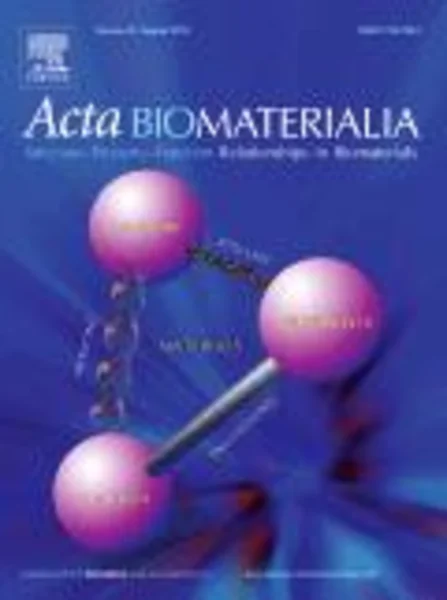-
high-efficiency matrix modulus-induced cardiac differentiation of human mesenchymal stem cells inside a thermosensitive hydrogel
جزئیات بیشتر مقاله- تاریخ ارائه: 1392/01/01
- تاریخ انتشار در تی پی بین: 1392/01/01
- تعداد بازدید: 689
- تعداد پرسش و پاسخ ها: 0
- شماره تماس دبیرخانه رویداد: -
mesenchymal stem cells (mscs) experience an extremely low rate of cardiac differentiation after transplantation into infarcted hearts, in part due to the inability of stiff scar tissue to support differentiation. we hypothesized that delivering mscs in a hydrogel with a modulus matched to that of native heart tissue should stimulate msc differentiation into cardiac cells. we have developed a thermosensitive and injectable hydrogel suitable for the delivery of cells into the heart, and found that the appropriate gel modulus can differentiate mscs into cardiac cells with high efficiency. the hydrogel was based on n-isopropylacrylamide, n-acryloxysuccinimide, acrylic acid and poly(trimethylene carbonate)-hydroxyethyl methacrylate. the hydrogel solution can be readily injected through needles commonly used for heart injection, and is capable of gelling within 7 s at 37 °c. the formed gels were highly flexible, with breaking strains (>300%) higher than that of native heart tissue and moduli within the range of native heart tissue (1–140 kpa). controlling the concentration of the hydrogel solution resulted in hydrogels with three different moduli: 16, 45 and 65 kpa. the moduli were decoupled from the gel water content and oxygen diffusion, parameters that can also influence cell differentiation. mscs survived in the hydrogels throughout the entire culture period, and it was observed that gel stiffness did not affect cell survival. after 14 days of culture, more than 76% of mscs had differentiated into cardiac cells in the 45 and 65 kpa gels, as confirmed by the expression of cardiac markers at both the gene and protein levels. mscs in the hydrogel with the 65 kpa modulus had the highest differentiation efficiency. the differentiated cells also developed calcium channels that imparted an electrophysiological property, and gap junctions for cell–cell communication. the efficiency of differentiation reported in this study was much higher than for the differentiation approaches described in the literature, such as chemical induction and co-culture of mscs and cardiomyocytes. these results indicate that the novel hydrogel holds great promise for delivering mscs into an infarcted heart for the generation of new heart tissue.
مقالات جدیدترین رویدادها
-
استفاده از تحلیل اهمیت-عملکرد در ارائه الگوی مدیریت خلاقیت سازمانی و ارائه راهکار جهت بهبود
-
بررسی تاثیر ارزش وجوه نقد مازاد بر ساختار سرمایه شرکت های پذیرفته شده در بورس اوراق بهادار تهران
-
بررسی تأثیر سطح افشای ریسک بر قرارداد بدهی شرکت های پذیرفته شده در بورس اوراق بهادار تهران
-
بررسی تأثیر رتبه بندی اعتباری مبتنی بر مدل امتیاز بازار نوظهور بر نقد شوندگی سهام با تأکید بر خصوصی سازی شرکت ها
-
تأثیر آمیخته بازاریابی پوشاک ایرانی بر تصویر ذهنی مشتری پوشاک ایرانی (هاکوپیان)
-
تغییرات اقلیمی و پیامد های آن برمنابع محیط زیستی کشور و تاثیر گذاری آن بر شرایط زندگی
-
بررسی نقش ادبیات (داستان و شعر) در تثبیت هویت کودکان ایرانی
-
اثربخشی آموزش مداخله های تربیتی کلاس محور (برای معلمان) بر خودکارآمدی تحصیلی دانش آموزان
-
بررسی تناسبات حمام های ایرانی با رویکرد اقلیمی نمونه موردی حمام نوبر تبریز
-
بررسی ضریب رفتار و پارامترهای موثر بر آن در سیستم های دیوار برشی فولادی با مقاومت تسلیم پایین
مقالات جدیدترین ژورنال ها
-
مدیریت و بررسی افسردگی دانش آموزان دختر مقطع متوسطه دوم در دروان کرونا در شهرستان دزفول
-
مدیریت و بررسی خرد سیاسی در اندیشه ی فردوسی در ادب ایران
-
واکاوی و مدیریت توصیفی قلمدان(جاکلیدی)ضریح در موزه آستان قدس رضوی
-
بررسی تاثیر خلاقیت، دانش و انگیزه کارکنان بر پیشنهادات نوآورانه کارکنان ( مورد مطالعه: هتل های 3 و 4 ستاره استان کرمان)
-
بررسی تاثیر کیفیت سیستم های اطلاعاتی بر تصمیم گیری موفق در شرکتهای تولیدی استان اصفهان (مورد مطالعه: مدیران شرکتهای تولیدی استان اصفهان)
-
تحلیل اخلاقی و کلامی داستان حضرت موسی (علیه السلام) و حضرت خضر نبی (علیه السلام)
-
بررسی تاثیر قابلیت مقایسه صورت های مالی بر نوسانات نامتعارف بازده سهام
-
بررسی تاثیر وابستگی به گروه تجاری بر انتخاب حسابرس
-
تاثیر تنوع جنسیتی بر رفتار نامتقارن هزینه های عمومی اداری و فروش
-
واکاوی مبانی فقهی ممنوعیت تخریب محیط زیست




سوال خود را در مورد این مقاله مطرح نمایید :